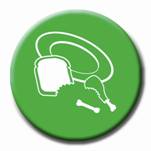 | Kitchen and Garden Waste |
| | |
Ash | |
| Coal ash - please place in a metal rubbish bin for disposal; never place hot ash in a plastic bin. In addition, make sure there are no burning embers and the ash is cool. Wood ash - is excellent for placing around the garden as a soil improver as it contains valuable minerals, or place small quantities in your compost bin. Make sure the ash is cool before use. | |
| | |
Christmas Trees (real) | |
| Consider purchasing a tree with a root so that it can be planted in the garden and used the following year or purchase a tree from a local, sustainably grown plantation. In the new year the council provides tree collection skips in several locations across the Island look out for updates; trees can also be taken to one of household waste recycling centre. See plastic for artificial trees. | |
| | |
Coffee Grounds | |
| Compost your coffee grounds in your home compost bin, or let us compost them for you by putting them out for collection in your green organics bucket. | |
| | |
Composting | |
| Over 30% of our household waste can be composted, including fruit and vegetable leftovers, tea bags, leaves, weeds, dead flowers, grass cuttings and general garden waste. Large quantities of autumn leaves are best composted separately. Compost is a rich fertiliser for the garden which will enrich and improve soil structure. Composting at home makes good use of material that might otherwise be dumped and put into landfill sites. Using compost instead of peat helps save rapidly disappearing areas that are important for wildlife. A kerbside green waste collection service is also available. This service is chargeable. | |
| | |
Cooking Oil | |
| Old vegetable oil generated by households should not be poured down the drain. If you have a home composter you can pour small quantities onto it (it's best to mix it first with paper and cardboard). If not, put one polythene bag inside another (in case of holes), fill with absorbent material and fill slowly with cold oil, then place in the dustbin. Other uses for it include making an oil and sand mixture to clean garden forks and spades, or you can dilute the oil with paraffin and rub onto outdoor wooden furniture to add life to it. Cooking oil from restaurants and hotels etc can be converted to biofuel by the following companies: Wight Made Bio-Diesel, Chris Sprackling Yarmouth, Isle of Wight 01983 531317 / 07794308103 | |
| | |
Corks | |
| Chopped up pieces of natural cork can be composted or you can use pieces of cork in the base of plant pots to help your plants retain moisture. | |
| | |
Dead Animals | |
| If you find a dead animal on the roadside contact Highways and Waste Services department, on 01983 821000, who will arrange to have it taken away. Please note: they will not take away: Rats; Ferrets; Birds; Pheasants; or Squirrels. | |
| | |
Flower Pots | |
| These can be returned to some garden centres for reuse. If broken, clay pots can be placed at the bottom of new planter pots to help improve drainage. Please do not put plastic or clay pots into kerbside green waste collection as this contaminates the load. | |
| | |
Garden Waste | |
| Garden waste rotting in landfill sites generates methane gas, which is a contributor to global warming. Garden waste, such as grass cuttings, weeds, prunings and leaves, can be recycled into compost. A low cost compost bin can be purchased through the council, call us on 823777, or order online. A kerbside green waste collection service is also available. This service is chargeable. Garden Waste can also be recycled at the household waste recycling centres | |
| | |
Garden Tools | |
| See metals. | |
| | |
Grass Cuttings | |
| See garden waste | |
| | |
Kitchen Waste | |
| You can put raw fruit and vegetable matter, coffee grounds, tea bags, and egg shells in a home compost bin. Cooked food or meat products should not be home composted. All cooked and uncooked food can be recycled using the green organics bucket. | |
| | |
Medicine | |
| Most unwanted medicine can be returned to pharmacies and chemists. Empty bottles can be rinsed and recycled as glass. | |
| | |
Nappies | |
| In the UK around 3 billion nappies are thrown away each year and around 90% end up in landfill, which can take hundreds of years to break down. If you choose to use disposable nappies choose ones that are dioxin free and/or unbleached. This should be marked on the packaging. An alternative is to use Real Nappies made from cotton/hemp/bamboo which can be washed and used over and over again. Click here for more information on real nappies. | |
Page last updated on: 14/05/2010





